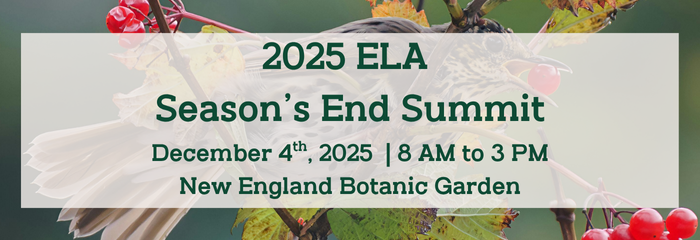
- This event has passed.
Ecological Landscape Alliance 2025 Season’s End Summit

ELA’s 2025 Season’s End Summit fulfills CEU requirements for any attending AOLCPs.
This year’s summit will feature 4 great speakers on the theme of ‘Fire and Water’. When managed properly, each has the potential to benefit landscapes and the environment. Dan Wilder will discuss fire on a New England Landscape, Melissa Cullina will introduce a new book on wetland plant ID, Trevor Smith will discuss the green roof project, and Jay Archer will talk about stormwater management.
Registration Details:
- ELA Member $ 129
- Non-Member $ 169
- ELA Member Virtual Registration $74
- Non-Member Virtual Registration $89
REGISTER HERE
Presentations & Agenda (exact time TBD)
Celebrating and Demystifying New England’s Aquatic Plants | Melissa Cullina, Vice President of Plants and Science, Coastal Maine Botanical Gardens
New England’s freshwater aquatic plants are at once incredibly beautiful, diverse, fascinating, and uniquely adapted to their watery environs. However, with derogatory colloquial names like pondweeds, duckweeds, pickerelweeds, and mermaid weeds, their special niche ecological adaptations and features – not to mention the rarity and imperilment of numerous species – have been long underappreciated. A ground-breaking and accessible new field guide will introduce thousands of nature enthusiasts, environmental advocates, lake stewards, and biologists to the importance, ecological significance, and specific diagnostic features of the hundreds of aquatic plants of New England’s lakes, ponds, rivers, streams, and estuaries. And – it will also share key diagnostic features of invasive plant species that threaten the integrity of our freshwater aquatic systems. Got paddles? A swimsuit? A passion for conservation? Then this field guide is for you! Join us on an incredible journey to observe, appreciate, evaluate, steward, conserve, and yes – sometimes, control — the underappreciated plants of New England’s aquatic ecosystems.
Green Roof Bus Shelter Initiative | Trevor Smith, Design & Education Director, ReEarth Studio at Social Impact Collective
In August 2024, the City completed the installation of green roofs on thirty bus shelters along the 28 bus route. The largest installation of its kind in North America, the addition of green roofs to bus shelters along busy and hot streets can help reduce extreme heat, provide direct shade at bus shelters, help reduce flooding from heavy rain, and improve plant pollinator biodiversity. Trevor Smith will take you through the design process as well as the process of getting a project of this scope done. Learn how small, simple steps can have a huge impact on our built environment and how this approach may be exactly what we need to begin to reverse the effects of climate change.
Innovative Stormwater Solutions: Landscape Engineering Beyond Grading and Drainage | Jay Archer, Landscape Ecologist; Landscape Designer; Founder of GJLD
What is more precious than water? Conservation and water quality are one of the most critical environmental issues we face in landscape ecology. We will explore techniques and processes for managing water in the landscape environment. Focusing on residential watersheds, we will consider innovative best management practices to optimize our use and treatment of water in our constructed landscapes. Taking a holistic view, we will examine design, construction, and management practices ranging from physical engineering ( catch basins, piping, dry wells etc.) to soils, topography, and plant selection
Historical and Future Fire: Lessons Learned at Chapin Barrens | Dan Jaffe Wilder, Director of Applied Ecology for the Norcorss Wildlife Foundation.
Historically, fire has been an active driver of ecosystems on the eastern seaboard for thousands of years, resulting in some of the region’s most unique natural communities and species. Roughly half of the region’s rare, terrestrial species can be found in these fire-adapted communities. However, landscape fires are significantly less common than they were 500 years ago. Modern wildfires are extinguished as quickly as possible or burn with such intensity that they are difficult to manage, often leading to destruction. Join Dan Jaffe Wilder, the Director of Applied Ecology at Norcross Wildlife Foundation, for a discussion about fire ecology, the history of fire in the region, the effects of fire suppression, and how to put fire back on the landscape in a safe and effective manner.